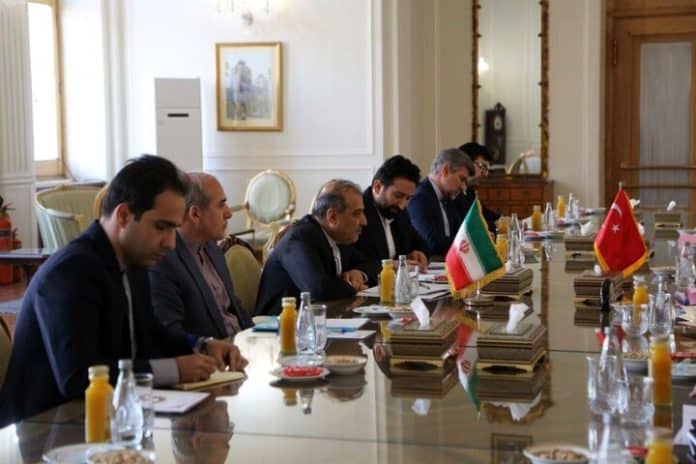Senior diplomats from Iran and Turkey have discussed the latest developments in Syria and Palestine in a meeting held at the headquarters of the Iranian Foreign Ministry in Tehran.
The meeting on Wednesday saw Iran’s Foreign Minister’s Senior Advisor for Special Political Affairs Ali Asghar Khaji and Turkey’s Deputy Foreign Minister Ahmet Yildiz discussing the latest political and international issues related to Syria as well as the situation on the ground in the Arab country.
Khaji and Yildiz conferred about future meetings between Iranian, Turkish, Russian, and Syrian authorities under the so-called Astana format and emphasized the significance of the process for establishing permanent peace in Syria.
The two diplomats also talked about the continued Israeli onslaught of the Palestinian people in Gaza and what impacts it could have on a potential wider conflict in the West Asia region.
Mean while, Ismail Haniyeh, the top political leader of Hamas, was in Cairo on Wednesday to hold talks with Egyptian officials about a possible truce in the war in Gaza as concerns in Israel grow over the fates of the dozens of hostages still being held in the enclave.
Israel and Hamas are attempting, via mediators in Egypt and Qatar, to discuss a new cease-fire that would see the release of Israeli hostages in Gaza, and some proposals have been put on the table, said an official familiar with the talks. An Israeli official said initial steps had been made in the negotiations, but emphasized there was no deal yet.
A senior Hamas official said Israel would need to abide by a new sustained cease-fire and allow the unlimited entry of aid into Gaza before Hamas would start discussing the release of more hostages. If Hamas sticks to those demands, that would mark a departure from an earlier hostage deal that was secured in November, when Hamas discussed a hostage release as part of a wider cease-fire arrangement.
“No negotiations under fire,” the official, Basem Naim, said in a text exchange.
“Allow all the needed aid to enter. Then we can start a comprehensive negotiation.”
Zaher Jabareen, another member of Hamas’s leadership, said “so far, there has been no positive response to any initiative.”
The comments may be more of an opening bid than a final offer: A full cease-fire, enacted without preconditions, would be unacceptable for Israel, since it would allow Hamas to remain in control of parts of Gaza.
“Anyone who thinks we will stop is disconnected from reality. We will not stop fighting until the realization of all the goals we’ve set: eliminating Hamas, freeing our hostages, and removing the threat from Gaza,” Benjamin Netanyahu, the Israeli prime minister, said in a statement on Wednesday.
But recent events have complicated the Israeli government’s negotiating position. International calls have grown for a cease-fire, and the accidental killing of three hostages by Israeli soldiers last week has heightened domestic pressure to secure another hostage deal.
Israel has vowed to topple Hamas’s rule in Gaza. On Oct. 7, Hamas launched a devastating surprise attack against Israel, killing roughly 1,200 people and abducting over 240, according to the Israeli authorities. Israel launched its campaign in Gaza in response. The war has devastated the small, densely populated coastal enclave, killing nearly 20,000 people, according to Gaza health authorities.
For many Palestinians there, the search for food and water has become a daily struggle. Although convoys of trucks bearing humanitarian aid trickle into Gaza on a daily basis, the United Nations and aid groups said they are far outmatched by the desperate need for essential supplies.
The United States, Britain and Germany — Israel’s biggest allies — have been pushing for Israel to at least slow down fighting in Gaza after nearly 10 weeks of war. Israeli officials, including Yoav Gallant, the Israeli defense minister, have said the fighting could go on for at least several months at varying levels of intensity.
Israel believes that 129 people kidnapped on Oct. 7, mostly men, are still being held captive in Gaza. A weeklong cease-fire that had allowed the release of dozens of hostages collapsed on Dec. 1 over disagreements about the remaining hostages. Israel resumed its bombardment of the enclave, pushing deeper into southern Gaza, where Israel says Hamas’s leaders are hiding.
Since the collapse of the deal, efforts to revive talks had failed to gain traction. Mr. Netanyahu vowed to keep fighting, even as criticism of his government’s handling of the war mounts both at home and abroad.
The Israeli military’s announcement on Friday that its forces had mistakenly shot and killed three Israeli hostages in Gaza City underscored the risks Israel’s campaign in Gaza poses to the remaining hostages. It has prompted desperate pleas from their families for an immediate deal to release them.
On Tuesday, Mr. Netanyahu met with representatives from the families of Israelis held hostage in Gaza and again pledged to bring them home. Israel’s largely ceremonial president, Isaac Herzog, also told foreign ambassadors that the country was willing to accept another cease-fire to free those held captive by Hamas.
“Israel is ready for another humanitarian pause and additional humanitarian aid in order to enable the release of hostages,” said Mr. Herzog, according to a statement by his office following the meeting.
The C.I.A. director, William J. Burns, met in Warsaw on Monday with David Barnea, the head of Israel’s Mossad intelligence agency, and Qatar’s prime minister for talks aimed at restarting hostage and prisoner exchanges, according to U.S. officials.
However, on Tuesday, President Biden expressed only cautious hopes of a deal. Answering a reporter’s question during a trip to Milwaukee, he said, “There’s no expectation at this point, but we are pushing.”














